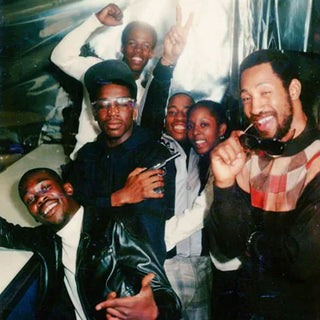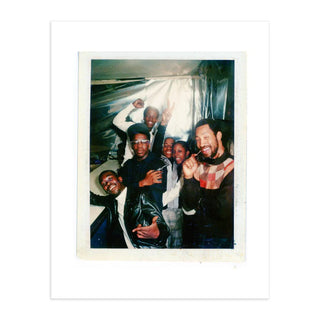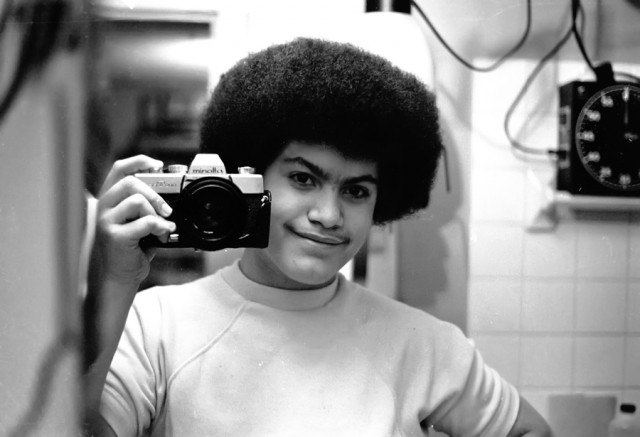About the photographer:
Born and raised in the Bronx, Joe Conzo Jr. acquired a passion for photography as a young boy attending the Agnes Russell School on the campus of Columbia University. He continued his formal artistic education at the School of Visual Arts (NYC).
During his early development, “Joey” bore witness to the volatile state of South Bronx community activism, and to the vanguard world of New York’s Puerto Rican cultural music scene. On any given day, he could find himself at the heels of his grandmother, the late Dr. Evelina López Antonetty (a dynamic leader and passionate activist ), engaged in a defiant act of civil disobedience for the educational rights of minorities in the South Bronx. On another day, he’d find himself clinging to the shirt-tail of his father, Joe Conzo Sr. (longtime confidant and biographer for the legendary orchestra leader and musician the late Tito Puente), behind-the-scenes with the giants of Latin music like Machito, Charlie Palmieri, Johnny Pacheco and Ray Barretto. These two vivid realities would have a profound effect on how Joey viewed his environment through the lens of a camera.
Coming of age as a young man and as a budding photographer, in the mid 70s, proved to be baptism by fire, during an unprecedented chapter of New York City urban decay. Joey was a part of a generation that had refused to be erased by corrupt politicians and a disparaging educational system. His talents had found their niche within the collective acts of defiance that boldly re-invented the very world that left them for dead. This socio-cultural movement would eventually be recognized in American History books as Hip Hop.
The art, music, dance and aesthetics of his generation gave rise to a consciousness that defied authority and inspired personal battles against silence and hopelessness. There, at its earliest stage, was Joey aka “Joey Kane” passionately embracing his role as official photographer in an unfolding drama. However, every revolution has its casualties, and very few emerged unscathed.
After a tumultuous period of substance abuse and homelessness, Joe Conzo Jr. wanted positive change in his life. With his archive of photographic works lovingly preserved in boxes by his mother, and by members of the legendary Cold Crush Brothers group, he pursued the change, one step at a time. His personal re-invention led him to the medical professions where he, eventually, received certification as a Medical Nurse. Later, he would join the New York Fire Department as an Emergency Medical Technician. It was his role as an EMT that delivered him to the World Trade Center on the morning of September 11, 2001.
Joe Conzo Jr.’s near-death experience, during the worst terrorist acts on US soil, strengthened his resolve to maintain control of his life. Among his life choices, he resumed his stalled relationship with a camera, and found his passion for life again from behind a lens. A few years later, he met American photographer and videographer Henry Chalfant, who was working on the documentary “From Mambo to Hip Hop: A South Bronx Tale.” Chalfant asked Joey for permission to include some of his Cold Crush Brothers images in the film. The collaboration sparked a friendship between the two that continues today. The documentary received the 2006 ALMA Award, Best Television Documentary.
“Born In The Bronx: A Visual Record of the Early Days of Hip Hop” (2007), Book Cover
In 2005, Joey was approached by noted New York musicologist and curator Johan Kugelberg, who was engaged in some research of his own into the roots of hip hop culture. The referral came via the legendary Grandmaster Caz, after tending to some inquiries by Kugelberg regarding any existing photographic images from that era. The meeting between Conzo and Kugelberg resulted in the publication of a seminal book on hip hop culture.
“Born In The Bronx: A Visual Record of the Early Days of Hip Hop” (2007) has received worldwide acclaim, and has since been translated into the German language. In 2008, the entire collection of images featured in the publication became part of a permanent archive housed at Cornell University. The Cornell Hip Hop Collection sits right along side the prestigious institution’s copy of The Gettysburg Address document.
Incredibly, the Cornell archive has thrived considerably, transforming Conzo and Kugelberg into key figures within its historic expansion. Recently, the Cornell Hip Hop Collection signed a deal with Conzo that would guarantee a permanent home for all his photographic images. The digitization of over 10,000 film images taken by him has already begun. The progress can be viewed at the Cornell University Library’s website.
Some of those pictures captured by a teen-age boy with his camera, throughout the 70’s and early 80’s, have traveled over land and sea, in one form or another, to various parts of Asia, Europe, and the Americas. They are regarded by genre experts and academia as an important lens into the roots of Hip Hop culture, and as being an integral source for any serious discourse on the movement.
Like most modern photographers, Joey has undergone the transition from film to digital. His work from behind the lens continues to reflect the main tenets of Hip Hop culture. As he once said, “Just because of a camera…,” he has traveled the USA coast-to-coast and has crossed oceans to parts of the world he thought he would never see, and everywhere he went the unfathomable spread of Hip Hop music, culture and dance was irrefutable.
Joe Conzo Jr. continues to lecture, meet with young people, exhibit his work, and attend international events.
About the photographer:
Born and raised in the Bronx, Joe Conzo Jr. acquired a passion for photography as a young boy attending the Agnes Russell School on the campus of Columbia University. He continued his formal artistic education at the School of Visual Arts (NYC).
During his early development, “Joey” bore witness to the volatile state of South Bronx community activism, and to the vanguard world of New York’s Puerto Rican cultural music scene. On any given day, he could find himself at the heels of his grandmother, the late Dr. Evelina López Antonetty (a dynamic leader and passionate activist ), engaged in a defiant act of civil disobedience for the educational rights of minorities in the South Bronx. On another day, he’d find himself clinging to the shirt-tail of his father, Joe Conzo Sr. (longtime confidant and biographer for the legendary orchestra leader and musician the late Tito Puente), behind-the-scenes with the giants of Latin music like Machito, Charlie Palmieri, Johnny Pacheco and Ray Barretto. These two vivid realities would have a profound effect on how Joey viewed his environment through the lens of a camera.
Coming of age as a young man and as a budding photographer, in the mid 70s, proved to be baptism by fire, during an unprecedented chapter of New York City urban decay. Joey was a part of a generation that had refused to be erased by corrupt politicians and a disparaging educational system. His talents had found their niche within the collective acts of defiance that boldly re-invented the very world that left them for dead. This socio-cultural movement would eventually be recognized in American History books as Hip Hop.
The art, music, dance and aesthetics of his generation gave rise to a consciousness that defied authority and inspired personal battles against silence and hopelessness. There, at its earliest stage, was Joey aka “Joey Kane” passionately embracing his role as official photographer in an unfolding drama. However, every revolution has its casualties, and very few emerged unscathed.
After a tumultuous period of substance abuse and homelessness, Joe Conzo Jr. wanted positive change in his life. With his archive of photographic works lovingly preserved in boxes by his mother, and by members of the legendary Cold Crush Brothers group, he pursued the change, one step at a time. His personal re-invention led him to the medical professions where he, eventually, received certification as a Medical Nurse. Later, he would join the New York Fire Department as an Emergency Medical Technician. It was his role as an EMT that delivered him to the World Trade Center on the morning of September 11, 2001.
Joe Conzo Jr.’s near-death experience, during the worst terrorist acts on US soil, strengthened his resolve to maintain control of his life. Among his life choices, he resumed his stalled relationship with a camera, and found his passion for life again from behind a lens. A few years later, he met American photographer and videographer Henry Chalfant, who was working on the documentary “From Mambo to Hip Hop: A South Bronx Tale.” Chalfant asked Joey for permission to include some of his Cold Crush Brothers images in the film. The collaboration sparked a friendship between the two that continues today. The documentary received the 2006 ALMA Award, Best Television Documentary.
“Born In The Bronx: A Visual Record of the Early Days of Hip Hop” (2007), Book Cover
In 2005, Joey was approached by noted New York musicologist and curator Johan Kugelberg, who was engaged in some research of his own into the roots of hip hop culture. The referral came via the legendary Grandmaster Caz, after tending to some inquiries by Kugelberg regarding any existing photographic images from that era. The meeting between Conzo and Kugelberg resulted in the publication of a seminal book on hip hop culture.
“Born In The Bronx: A Visual Record of the Early Days of Hip Hop” (2007) has received worldwide acclaim, and has since been translated into the German language. In 2008, the entire collection of images featured in the publication became part of a permanent archive housed at Cornell University. The Cornell Hip Hop Collection sits right along side the prestigious institution’s copy of The Gettysburg Address document.
Incredibly, the Cornell archive has thrived considerably, transforming Conzo and Kugelberg into key figures within its historic expansion. Recently, the Cornell Hip Hop Collection signed a deal with Conzo that would guarantee a permanent home for all his photographic images. The digitization of over 10,000 film images taken by him has already begun. The progress can be viewed at the Cornell University Library’s website.
Some of those pictures captured by a teen-age boy with his camera, throughout the 70’s and early 80’s, have traveled over land and sea, in one form or another, to various parts of Asia, Europe, and the Americas. They are regarded by genre experts and academia as an important lens into the roots of Hip Hop culture, and as being an integral source for any serious discourse on the movement.
Like most modern photographers, Joey has undergone the transition from film to digital. His work from behind the lens continues to reflect the main tenets of Hip Hop culture. As he once said, “Just because of a camera…,” he has traveled the USA coast-to-coast and has crossed oceans to parts of the world he thought he would never see, and everywhere he went the unfathomable spread of Hip Hop music, culture and dance was irrefutable.
Joe Conzo Jr. continues to lecture, meet with young people, exhibit his work, and attend international events.



